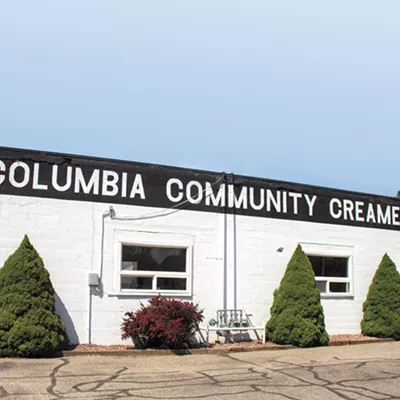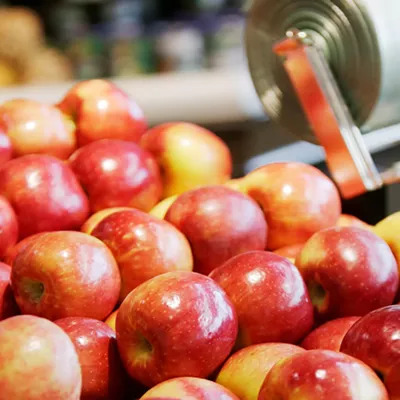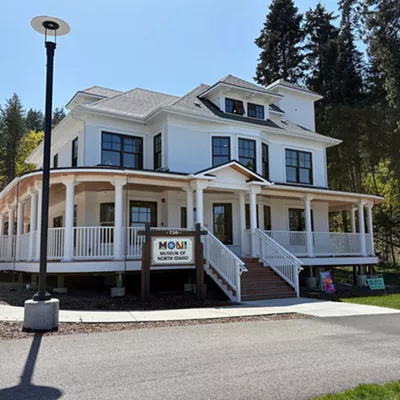
For the first time in more than 130 years, Spokane's sole surviving daily newspaper is preparing for new ownership — the Cowles family announced last week that they will donate the Spokesman-Review to a nonprofit formed by the paper's executive editor, Rob Curley.
On Tuesday, April 15, Spokesman Publisher Stacey Cowles announced that his family's Cowles Company plans to transfer the paper to the nonprofit Comma Journalism Labs and to donate $2 million to the effort. The deal is contingent on the nonprofit pulling together $2 million in matching donations from the community.
Members of the Cowles family have owned and led Spokane's daily print media market since the 1890s. In 1894, the Spokane Falls Review (founded in 1883) merged with the Spokesman, to become the Spokesman-Review under the Cowles Company. In 1897, Cowles Co. also purchased the competing afternoon daily paper, the Spokane Daily Chronicle, but kept the papers separate for decades. A century later, the morning and afternoon dailies combined their staffs completely; the Chronicle stopped printing in 1992.
Under Comma, which could take control of the paper later this year if sufficient donations are secured, the plan is to keep printing six days per week (at least for now), maintain subscriptions and a paywall for online content (with free access to stories by grant-funded reporters and some major breaking news), and continue to sell advertising.
The ability to accept donations will add another revenue stream to what Cowles says has been essentially a break-even model in recent years.
"Time will really tell, but the idea is we're a marginally successful operation at this moment, meaning we're break-even-plus. So to have that cushion means we can afford a bad year or two," Cowles tells the Inlander. "We're committed to staying in business, and the philanthropy becomes the rainy day fund and the path to give us a little extra to invest for the future."
Cowles will serve on the nonprofit's board of directors. He started out on the advertising/sales side of the paper in 1989, quickly working his way up to classified advertising manager. But he took the publisher's chair sooner than anticipated in 1992 after his father died of a heart attack while jogging.
When asked if donating the paper after four generations is bittersweet, Cowles says the next generation in his family hasn't shown a passion for the media business.
"If that was different, maybe we'd make a different decision," Cowles says. "But I think it's partly financial, too. I mean, the promise that newspapers offer as a financial asset is not great."
INDUSTRY CHALLENGES
Various pressures in the newspaper industry have significantly reduced profits in recent decades. Since 2005, the country has lost more than 3,200 print newspapers, or one-third of all papers in just two decades, according to Northwestern University's Medill School of Journalism.
Between the advent of the internet and the Great Recession, newspapers lost virtually all classified advertising, which accounted for roughly one-third of their revenue, Cowles says. Google and other search engines, which may drive traffic to newspaper websites, also don't pay to run their headlines, he says.
"In the old days, you know, you could look at the top half of the paper and you could get three headlines for free, but you had to put your money in to get the whole thing," Cowles says. "Now the whole thing is indexed and in today's world of short attention spans, often that's all anybody needs."
Online shopping's impact on brick-and-mortar retailers has also played a large role, with the closure of stores that were traditionally big advertisers. Cowles says that in the 1960s, advertising by Spokane's Crescent department store alone accounted for maybe 10% of the paper's revenue.
"It's hard to kind of parse out how much of newspapers' shrinkage has occurred because of that traditional retailing going away," Cowles says. "The model used to be that 70% of a newspaper's revenue was advertising and 30% was subscriptions and single copy [purchases]. That's pretty much flipped on its head now."
As the price to subscribe grows, and younger generations are less willing to pay for news — a major goal for the Spokesman moving forward is to convince people in their 20s, 30s and 40s that subscriptions are worth it, Cowles says — another option seemed necessary.
The idea to go nonprofit came together over the last few years, and Cowles says he polled family shareholders to get their thoughts about the paper's future. He says about 40% said if it's not losing money to hang onto it, and about 40% said if a nonprofit would make sense and get more resources, they'd favor that. There was no interest in selling to a business that might come in and fire reporters to try to squeeze more profit out of the operation, Cowles says.
"Zero said, 'Sell it, and watch it get reduced to eight pages a day,'" Cowles says. "We've had 132 years of stewardship, but we plan to see it last another 100 years. And our thinking is, you know, it's sort of the public mission, and it seems right that the public would own it and carry it forward."
HYBRID NONPROFIT
The hybrid model under Comma will be similar to that used by the Salt Lake Tribune, which was the first legacy newspaper to become a nonprofit in 2019.
With a similarly long history, the Salt Lake Tribune saw various changes in family ownership until 2010, when hedge fund Alden Global Capital bought the paper and renegotiated a partnership the paper had with the Deseret News, which is owned by the Latter-day Saints church. Since the 1950s, the newspapers had a joint operating agreement in place to share advertising, delivery and production. In 2014, Alden renegotiated the agreement "to the Tribune's financial disadvantage, prompting layoffs, a lawsuit and a U.S. Department of Justice investigation," according to the Tribune's website.
After Utah businessman Paul Huntsman bought the paper in 2016, they worked to become a nonprofit, gaining that status in 2019. The paper now prints two days per week.
Tim Fitzpatrick, whose grandfather shepherded the publication as its publisher in the mid-20th century, worked at the Tribune for 45 years and served in various leadership roles.
Fitzpatrick says he helped create the paper's paywall as more content shifted online. It didn't result in the loss of many readers, he says, and it made sense while the paper was for-profit.
"But when you go nonprofit, you're in a different dynamic, you're a public service," Fitzpatrick says. "The analogy we'd use is if you go to the opera or symphony, it's a nonprofit, but they still charge you $50 to go."
In the same way the symphony might then offer free concerts at schools and in parks as a public service, he says the Tribune similarly offered the paper without a paywall to libraries and schools.
"I'm assuming at this point the Spokesman has a paywall, and they'll probably keep it because the economics of dumping it on Day 1 are a little rough. But I also think they should work on dumping it, which I think the Tribune is working to do by the end of this year," Fitzpatrick says. "As a subscriber you pay so you can read. As a donor you pay so other people can read. It is fundamentally different."
Fitzpatrick, who retired about a year ago after a final stint as an energy reporter — a position funded by a major utility that ultimately decided not to renew its funding — also warns about the potential for donors to pressure newspapers in the same way advertisers might threaten to stop advertising if they disagree with coverage. He says just as traditional newsrooms maintain editorial independence from their sales departments, nonprofit newsrooms need to do the same.
"That's a dance. I did things the utility wasn't always thrilled with, and they didn't want to continue. I never got feedback from them, they just decided not to continue," he says. "Absolutely the rule is still the same, you absolutely have to maintain your editorial independence, same as with advertisers. You can't be pressured by these people, you walk away from their money. You have to, 'cause otherwise your credibility is dead."
PHILANTHROPY AND BEST WISHES
Former Spokesman writers say they're hopeful about the announcement that the paper is going nonprofit.
Shawn Vestal, who was an editorial writer for the paper for almost 25 years, says he wishes the paper well with the new move.
"I think it's a creative idea, and I hope it works because I live here and want a vibrant daily newspaper," Vestal says. "It's definitely a time that alternative approaches to help journalism survive are needed."
Vestal says he was surprised at how robust the nonprofit news industry already is when he worked as an editor at nonprofit InvestigateWest over the last year (he's now working at a local university).
"I underestimated just how far down the road we are with that," Vestal says. "I felt like maybe this is kind of a future idea that a few people are trying, but it's a much more robust, fleshed out thing that's happening across the country."
Pia Hallenberg, who worked as a reporter and editor for the Spokesman from 2004 to 2017, says she appreciates that the paper is staying local.
"I feel certain that the paper could have been sold to the highest bidder, and I also feel certain that whoever the highest bidder was would've slaughtered it for the tax writeoff, and then we wouldn't have a paper left at all," Hallenberg says. "I'm happy they're staying here and it gives us a chance to keep it."
Hallenberg now works as a freelance grant writer, applying for funding for clients. She says the matching requirement for the $2 million donation is a typical request in the nonprofit world, as donors like to see the community have some skin in the game. But with so many federal grants currently paused or under threat, she says it could be difficult to raise the match.
"I think raising $2 million in Spokane under any circumstances is difficult, it's challenging. Do I think it's impossible? Hopefully not," she says. "I think they really have their work cut out for them."
Sharon Smith and Don Barbieri are some of Spokane's best-known philanthropists. Their charitable organization, the Smith-Barbieri Progressive Fund, has been giving out grants to local nonprofits since 2010, sometimes to the tune of $1 million a year.
The Smith-Barbieri Progressive Fund currently supports RANGE Media, a Spokane-based, worker-owned news outlet, and in the past has given grants to the Spokesman to help fund racial equity and health reporters.
Smith is cautiously optimistic about the Spokesman's shift. Since a board of directors guides a nonprofit, the makeup of that board is key, she says.
"As a subscriber you pay so you can read. As a donor you pay so other people can read. It is fundamentally different."
"In our minds, the path would be to make sure that the composition of your board is appropriate," she says. "That would mean somebody from every walk of life, and also that there is incredible transparency and honesty in terms of how they influence the news that's reported."
Smith expects Comma will seek major funding dollars from institutional givers — like local banks, power companies or other large companies with substantial marketing dollars — and says the newspaper would therefore need to be very clear about how those dollars do or don't affect reporters' work.
Smith also says the paper should work to eliminate its paywall as it becomes a nonprofit that gets tax breaks.
"Taxpayers really are participating in this. So if you're going to be a community entity, then we believe it should be no barrier," she says. "It shouldn't have a subscription fee. Because then you are immediately just eliminating a large segment of the population."
Still, she applauds the Spokesman for trying to adapt to a new world.
"I'm not sure that traditional media has a choice anymore," she says. "They can either stay like they are and potentially not exist, or they can find different ways to operate. I think it's incumbent, actually, upon media who want to do a good job and remain relevant to find new avenues."
NEXT STEPS
Curley started the process of setting up Comma as a nonprofit in 2023, and it received official 501(c)(3) status in September 2024.
Last year, as the Spokesman helped the Black Lens newspaper relaunch, Comma was announced as a nonprofit partner, sharing office space with the community newspaper on Gonzaga's campus. In a statement, Gonzaga University congratulated the Cowles family on their decision to donate the paper to Comma.
Cowles confirmed the plan is to ultimately have the Spokesman's staff leave the Review Building on Riverside Avenue and work out of a space on Gonzaga's campus, and he said they've been working on a deal to renovate a building on campus to house the newspaper staff.
The university says they're still in talks about a potential partnership.
"Gonzaga has actively supported Northwest Passages, space for staff of The Black Lens, and an office for Comma during its start-up phase, at the Schoenberg Center on campus," Gonzaga's statement reads. "We have had discussions regarding the possibility of supporting Comma through additional space resources, but no commitment has been made. The University and Comma will continue to evaluate the feasibility of this concept during the upcoming months."
One of the big pushes under the nonprofit model will be to expand partnerships with local schools, Curley says. He says the paper's paid high school intern program, which was funded by a grant from Bank of America over the last four years, has been one of the greatest joys of his career. He hopes to work with other school districts and is talking to universities throughout the region as well.
"Education is a key part of what we're working towards, both from an information standpoint and from a skill set standpoint," Curley says. "I don't believe in my heart that it's a 50-year-old guy from Kansas who's going to figure out how to connect to a 16-year-old. I feel like you have to have 16-year-olds who understand what journalism is and what they need to know."
Comma has hired a full-time development director who is taking over the efforts to raise money for the nonprofit, and the plan is to keep all of the more than 50 full-time newsroom staff on board at the same or better pay.
With subscriptions currently accounting for about 70% of the paper's revenue, those will remain key, he says. Working with Bridgespan Group, a nonprofit consulting firm, Curley says they learned that people may be even more willing to subscribe with the paper becoming a nonprofit, which is hopeful.
"We feel confident that our numbers are going to go up, not down," Curley says. ♦
Eliza Billingham contributed to this story.























